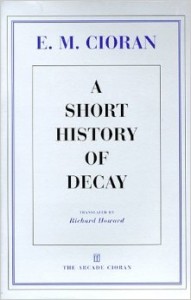 How best to describe Emil Cioran? How classify him? He is a philosopher without the philosopher’s linearity of thought, an aphorist whose every sentence achieves the heightened perfection of poetry. A Short History Of Decay was his first French work, the product of two years of, as he put it, “dueling with existence.” As with On The Heights Of Despair, the book is organized into chapters, which are themselves divided into sections, and the whole affair is only loosely brought together via the theme of, well, decay – personal, social, civilizational. I have of late been reading a number of alarming reports on the state of modern society: the decline of marriage, the rise of single parenthood, negative birthrates, social stratification, and as I now reread certain marked passages it occurs to me how terribly relevant Cioran is today. Rather than attempt to discuss the whole of his work, I will approach him as he presents himself, piecemeal.
How best to describe Emil Cioran? How classify him? He is a philosopher without the philosopher’s linearity of thought, an aphorist whose every sentence achieves the heightened perfection of poetry. A Short History Of Decay was his first French work, the product of two years of, as he put it, “dueling with existence.” As with On The Heights Of Despair, the book is organized into chapters, which are themselves divided into sections, and the whole affair is only loosely brought together via the theme of, well, decay – personal, social, civilizational. I have of late been reading a number of alarming reports on the state of modern society: the decline of marriage, the rise of single parenthood, negative birthrates, social stratification, and as I now reread certain marked passages it occurs to me how terribly relevant Cioran is today. Rather than attempt to discuss the whole of his work, I will approach him as he presents himself, piecemeal.
One of Cioran’s central contentions is that life cannot be faced head on. “Man is the dogmatic being par excellence,” writes Cioran, “and his dogmas are all the deeper when he does not formulate them, when he is unaware of them, and when he follows them.” These dogmas are essentially protective, comfortable lies we tell ourselves in order to live. “No one can live after having decimated his superstitions,” he warns us, and these include not only religion (he calls God the “supreme pretext of dialogue”) but love as well:
If life occupies the first place in our hierarchy of lies, love comes immediately afterward, lie within the lie. Expression of our hybrid position, love is surrounded by an apparatus of beatitudes and torments thanks to which we find in someone a substitute for ourselves. By what hoax do two eyes turn us away from our solitude? Is there any failure more humiliating for the mind?Love lulls knowledge; wakened, knowledge kills love. Unreality cannot triumph indefinitely, even disguised in the appearances of the most exalting lie. And moreover who would have an illusion solid enough to find in the other what he has vainly sought in himself? Would a furnace of guts afford what the whole universe could not give us?
I am particularly fond of that phrase “furnace of guts,” at once so repulsive and so true, used to describe a loved one, and the conceit of love as a kind of madness, enabled by a suspension of reason rather than reason’s apotheosis. Is there any question more absurd than “Why do you love me?” It is the demand for reasoned justification in a domain where reason holds no sway. Worse, it’s an intrusion on the lover’s fantasy, a puncturing of the illusion of seamless union. Nor can Cioran help but remind us of love’s bodily provenance:
Consider love: is there a nobler outpouring, a rapture less suspect? Its shudders rival music, complete with the tears of solitude and of ecstasy: sublime, but a sublimity inseparable from the urinary tract: transports bordering upon excretion, a heaven of the glands, sudden sanctity of the orifices…
Given the choice between love’s sublimity and the “heaven of the glands,” who would not prefer the comforting illusion?
In another work, Cioran praises Nietzsche, Baudelaire and Dostoevsky as “masters in the art of thinking against oneself,” writers who “teach us to side with our dangers, broaden the sphere of our diseases, to acquire existence by division from our being.” To think against oneself, to scrutinize our motives and most deeply held convictions, is indeed to side with our dangers, give force to our most destabilizing thoughts. With respect to the above-mentioned eminent writers, there is one figure in literature who is the embodiment of “thinking against oneself,” and that is Hamlet. I ask you to consider the following passage:
His sneers have devastated life before he has exhausted its juice. He is a crossroads Ecclesiast who finds in the universal meaninglessness an excuse for his defeats. Eager to find everything unimportant, he succeeds easily, the evidence preponderant on his side. In the battle of arguments, he is always the winner, as he is always the loser in action: he is “right,” he rejects everything – and everything rejects him.
Has a more apt description of Hamlet ever been written? Does this not apply to everyone in danger of thinking themselves out of existence?
It is a mistake to think of Cioran as a philosopher. He is not programmatic or prescriptive; he offers little in the way of solace or recompense. His function – his appeal, if he has one – is as a chronicler of decay, someone who charts with unflinching honesty the contours of what was once called despair, before it was neutered with that all-encompassing diagnosis, depression. And somehow, by giving it size and shape and weight, he makes it appear almost manageable. If that, too, is an illusion, it is one I cannot live without.